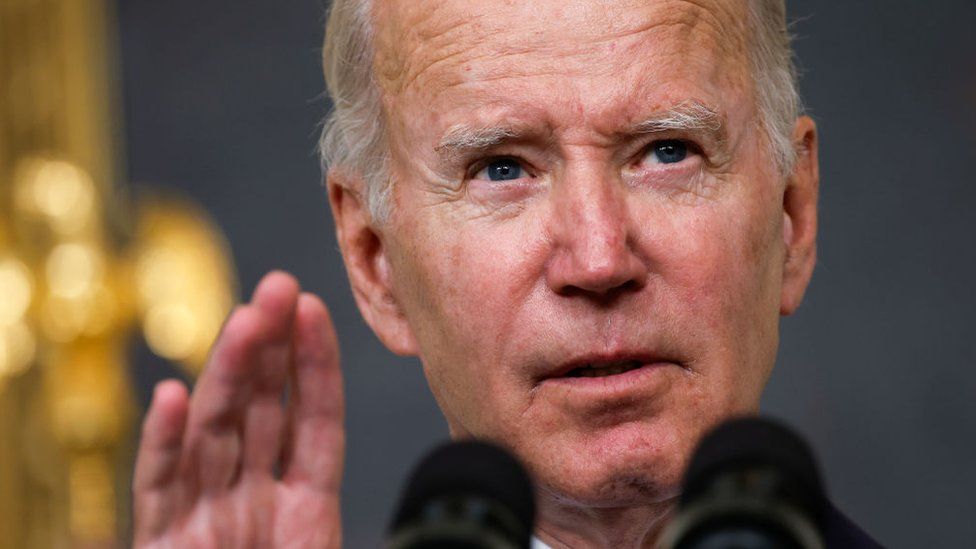ARTICLE AD BOX
By Sam Cabral
BBC News, Virginia
 Image source, Getty Images
Image source, Getty Images
US Democrats have said they will move forward with sweeping legislation to raise corporate taxes, lower healthcare costs and fight climate change.
The $739bn (£610bn) package pares back several Democrat proposals since last year that amounted to trillions in new spending, but it remains significant.
Democrats say it also represents "the single biggest investment in climate change in US history".
The bill could reinvigorate President Joe Biden's stalled domestic agenda.
Democratic Senator Joe Manchin, who represents the conservative state of West Virginia, had objected to previous offers, citing fears more spending could worsen inflation.
But he announced sudden support for the bill on Wednesday night, in an about-face deal with Senate Democratic leader Chuck Schumer that has taken Washington by surprise.
"It's a big deal," President Biden said on Thursday. "It's a bill that will cut your cost of living, reduce inflation and lower the deficit. It strengthens our economy for the long run."
What's in the bill?
Democrats are proposing health care, climate change and deficit reduction strategies they hope will combat inflation, which is running at a 40-year high in the US.
The so-called Inflation Reduction Act also comes as the White House seeks to calm mounting fears of a recession. Data released on Thursday showed the US economy has shrunk over two consecutive quarters.
The bill invests $369bn (£305bn) into tax incentives for renewable energy production. That includes $60bn in tax credits for clean energy manufacturing, $30bn in tax credits for wind and solar production, and tax breaks for consumers who go green - such as a $7,500 write-off on new electric vehicle purchases for anyone making $75,000 or less annually.
US Energy Secretary Jennifer Granholm told the BBC's Laura Trevelyan on Thursday that the investments would "propel the US in terms of our climate ambitions".
"We've got to significantly expand our clean energy capacity in order to meet our Paris goals and in order to meet the President's goal of 100% clean electricity by 2035. So [this legislation] is going to give us the tools to see that deployment happen."
Also included in the package is a three-year $64bn (£53bn) extension of health insurance subsidies purchased through the government marketplace. Consumers were soon to be informed their rates will go up later this year, but the move ensures that will not happen.
Much of the revenue for the bill is raised by a new 15% minimum tax on corporations that earn more than $1bn in annual profits.
The Biden administration has been negotiating with several countries around the world since last year on a 15% global minimum corporate tax, in an effort to limit international tax havens. If executed in the US, the tax will target some 200 US corporations and raise some $313bn (£258bn) over the next decade, Democrats say.
The legislation also raises money by beefing up tax enforcement, closing what's viewed as a tax loophole for investment managers, and lowering prescription drug costs for seniors by allowing Medicare - the government health insurance programme for the elderly - to negotiate drug prices.
All told, the Democratic proposal puts about $300bn to a federal deficit that rose exponentially during the Covid-19 pandemic.
Several party priorities, however, were left behind in the deal reported this week, including investments in affordable childcare, pre-school and elder care, and the extension of a monthly child tax credit that experts argued had dramatically reduced child poverty in the short term.
Image source, Getty Images
Image caption,The surprise deal was announced on Wednesday night by Senate Majority Leader Chuck Schumer (left) and Senator Joe Manchin (right)
What happens next?
Passage of the bill is not guaranteed.
While Senator Manchin's support is crucial, Democrats also need to gain the backing of another frequent thorn in the administration's side and a tax hike sceptic: Senator Kyrsten Sinema of Arizona.
Majority Leader Schumer hopes to take up the bill in the Senate next week under a budgetary manoeuvre that circumvents regular order. It would allow him to pass the measure by a simple majority vote - with only the support of Democrats - in the evenly split chamber. But whether he can do so has yet to be ruled on.
Political in-fighting among Democrats and a spate of Covid-19 infections on Capitol Hill could also complicate the bill's passage. The party controls the Senate by a single seat and only holds a four-vote majority in the House of Representatives.
None of those factors account for how Republicans will respond to the bill. The party is expected to be unified in its resistance to a bill that raises taxes during an economic slowdown.
Party leaders had threatened to impede other legislation if Democrats continued negotiating on the package. Reacting to the deal on Wednesday night, Minority Leader Mitch McConnell said: "First they killed your family's budget. Now they want to kill your job too."

 2 years ago
44
2 years ago
44








 English (US) ·
English (US) ·